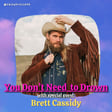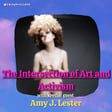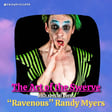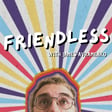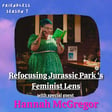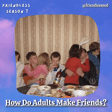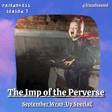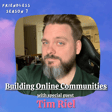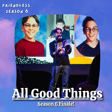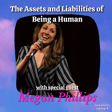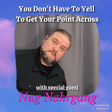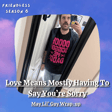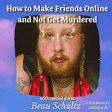Introduction and Guest Welcome
00:00:08
Speaker
Well, hey there, sweet peas. Welcome back to Friendless. I'm your host, James Avramenko, back once again with a brand new episode. And this week I have an incredible guest on my show, the one, the only, RJ City.
Exploring RJ City's Diverse Career
00:00:21
Speaker
RJ is the host of one of my favorite YouTube shows, Hey EW, as well as a reoccurring presence on All Elite Wrestling. He's a pro wrestler, he's a comedian, and he was an absolutely incredible guest.
Planned Topics: Mental Health and Pro Wrestling
00:00:34
Speaker
We talk about mental health and intimacy within the pro wrestling industry and so much more. It was such a pleasure chatting with RJ and I think you're going to love this one. So lean back, get comfy and enjoy my interview with RJ City here on Friendless.
00:00:48
Speaker
This week I have an incredible, just out of the blue guest that I was never expecting to have on. I couldn't be more excited. He's the host of the show that internally I always call, hey, ew. He's a pro wrestler. He is a color commentator for AEW and he's an absolutely incredible, just presence on the internet. The one, the only RJ City.
Humorous Critique of the Introduction
00:01:15
Speaker
How are you doing today?
00:01:15
Speaker
You know, when you say incredible, and then you follow it with, ah, ah, it kind of undoes the value of incredible.
00:01:27
Speaker
You know, I find myself, I add a lot of us into just my lexicon, you know? Sure. Yeah, but I mean, when you say incredible, my body went, huh? And then I had to hang there for a little bit. You know, it's about suspense. I'm building up the suspense for it, right? Right. Well, you could have just, even if you just said he is a host, you know, neutral statement, can't disagree with that.
00:01:56
Speaker
I feel no neutrality to it. I just had to be sure I was picking the right term for it. Thank you. Of course.
Finding Joy and Bob Hope Special
00:02:02
Speaker
RJ, I'm trying out a new question with you just to really see how we can kind of open up this conversation. What is something that is bringing you joy this week? So little.
00:02:21
Speaker
So little. It's it's the things that like I cling to. And then I go, are they are these even bringing me joy or are they just not as bad that the things are upsetting? Are there is there are there specific? What are the things that you're cleaving to right now? Well, I'll tell you, I found a this has been a little bit of a journey for me.
00:02:49
Speaker
I follow odd things on Instagram, as I'm sure you do. There is a Bob Hope special from 1988 called the Hope News Network. And I only saw the ad for it. And I sent it to our mutual friend, Nugg.
00:03:07
Speaker
And I was like, oh my God, this looks horrendous. I have to watch it. And I looked it up, could not find it anywhere. And so now I'm intrigued. It seems as if the Bob Hope estate scrubbed most of his more modern specials off the internet. A, because he looks like he's dying. And B, because the jokes are horrible and probably really, really racist. Like Bob Hope's legacy doesn't have enough problems already.
00:03:37
Speaker
And I'm not even a fan of Bob Hope. Yeah. But it also had Brooke Shields, Morgan Fairchild and Yakov Smirnoff and a comedian weatherman. And I'm like, I got to see this. I have to see this. I don't care. So I put it out there and this guy online went found it through some Internet archive thing and sent it to me. And I, you know, cleared the calendar. Yeah. Hold my calls. Oh, and sorry, it also has Tony Randall in it.
00:04:07
Speaker
So as you can imagine, Tony Randall said, I had to run to watch this. And it was so offensive. It was so, so bad. You know, even the good things that I would consider good were just bad, but I enjoyed it so much. But then I have to go back and I go, why did I enjoy that?
Pressure of Maintaining Quality
00:04:30
Speaker
Probably because when I'm doing my work and I'm doing hay and stuff,
00:04:37
Speaker
The whole time I'm writing, planning, and home going, gee, I hope this is good. I hope this goes remotely well. Most of the time, I think the next three or four interviews I have are all with people who know English as a second language and who might not even be described as fluent in English.
00:04:55
Speaker
And who are still people that I respect immensely. And I have to get humor out of the situation without insulting them. So it's, I think the joy is watching someone like Bob Hope, who's this like Titan figure, not be too concerned with any of that. Not be burdened by quality, quite frankly.
00:05:18
Speaker
But do you not find that like having that burden of almost like, I would kind of categorize it as something like empathy, you know, like not wanting to just make a fool of your guest or not kind of talk down to them. Is that not like a burden that's kind of worth taking on, you know? Yes, and I wouldn't even, I would push back on the empathy. I don't even know if it's empathy. I also feel like it would not be received well by people who view it. That's exactly right, yeah.
00:05:46
Speaker
So I can't even. It's uninteresting, right? Like, why would you, like, it's kind of been done in a way, right? Yes. It would be, A, easy to do, B, bad to the guest. Who is trusting me by coming on the show? And three, just not well received. Certainly not the society we're living in anymore. So I enjoy watching things of a time where I was like, oh my God, this is not an issue at all. And it's also bad.
00:06:12
Speaker
I think that's what I love about it. And I love people who get so successful that they are removed from reality and can't tell when they're no longer a success. Yeah, yeah. Because that's a fear I have, not to say that I'm a success, but we have done, Wednesday we will have taped our 100th episode of Hey.
00:06:39
Speaker
And I feel, every episode I feel just as insecure as when I did the first one. So to see somebody who seems totally free of those mental constraints is like porn for me. It's just as unrealistic as porn. Sex and porn and the reality of my work to Bob Hope's 1988 special is my version of porn.
00:07:05
Speaker
you know it's funny actually something so I talk many many times on the show I talk I always bring up my therapist Scott shout out Scott he's a great guy and and we talk often about these ideas of like taking these concepts of
00:07:22
Speaker
you know, masculinity, right? You know, that can so easily get flipped into toxicity. You know, these ideas of like being so confident that you don't allow others opinions to kind of knock you off your stride or anything like that. And sort of, you know, looking at a figure like Bob Hope and, you know, you can see some really good qualities within that presentation, but you can just see the easy pitfalls of it, right? You know, you can learn from him, right?
00:07:50
Speaker
Yes, and I do feel like I've swung so far the other way. Sure, yeah. Because when I read the comments on my work, and I will read largely every comment, and I will say the vast majority of them are very, very good.
Impact of Online Criticism
00:08:06
Speaker
like 95%, which I think is very high ratio online. Big time, big time. And I think that only exists because I'm so critical of myself, you know? But it's one of those things where the good comments, the best comments will keep you at a neutral. Yes, yeah.
00:08:25
Speaker
So it's not even, so if I read a bad comment, I go down. But when I read a good one, I don't go up equal to the distance that I went down. So it's not that, it's all negative comments, it's that the good comments are sort of useless. I don't even allow myself to experience praise.
00:08:44
Speaker
Yeah. You know? Yeah. It's a horrible thing to think about. But I also go, and this is a mental deformity I have in general, if I lose my wallet for five minutes, I might as well just have lost it forever. Oh, yeah. Because I put myself through the emotional trauma of my life. I've lived a whole life without a wallet now. And when I have and then I find it, I don't even experience joy.
00:09:12
Speaker
I just go back. And not even that, it's just like, wow, you are an idiot. Well, that's just it. There's almost like a shame for having been like, when you do find where it is, you're like, oh, why didn't you look there first? How could you? Yes. I lost my, I was laying on my couch and I lost my remote control. I had not moved in probably two hours and it was gone. And of course it was beside me, you know, after I looked for 20 minutes and the shame,
00:09:40
Speaker
Yeah, the absolute shame of it. We rob ourselves of joy. Mm hmm. Because really, you were that upset about losing the remote that you should have been like, wow, I found it. Yeah, there's it should be like a real Blue's Clues moment of we've solved it. We did it, guys. Yeah, we found the remote. Yeah. Yeah. And then it makes us feel worse. Yeah.
00:10:08
Speaker
Gee, I wish that remote control stayed gone. I wish it actually vanished. That would have been easier to handle. I mean, I started going through all the scenarios of like, how do I even turn my TV off without it? Like, do I just unplug it and leave it? Do I even have a TV anymore? Is this my moment? Do I get rid of my TV finally? And then when you find the remote, but the thing is those questions are never really answered when you find the remote. They just still sit in your head.
00:10:36
Speaker
Yeah. Oh, yeah. Oh, yeah. It's fabulous. Yeah. Yeah. It's great. Love. Love living with all this anxiety and, you know, the nerve divergent. It's just it's it's fabulous. Fabulous. This to me, though, is true anxiety. There's a lot of people I got. I. Somebody ordered a cameo from me the other day and said, this is for my wife. She has anxiety because she's about to have a baby. And I said, I don't think that's anxiety.
00:11:05
Speaker
That's a legitimate concern. I understand why you're worried. It's another life. A lot of things can go wrong. It's just a normal reaction. Anxiety is sitting on your couch and just feeling horrible for no reason.
00:11:24
Speaker
That's a really beautiful little tweak on that too because yeah, there's, you know, yeah, these moments where it's like, you're supposed to be worried about this. That's okay. You know, being a parent is a, that's a big one, you know, life changes. You're allowed. You didn't feel like that. There would be something wrong with you.
00:11:39
Speaker
That's the problem. That's exactly right. You know, yeah. But but then we create these scenarios in our brain to just just stay worried and just, you know, it's like, you know, I know for me, it's like my nervous system just really likes being like a little bit sweaty, you know, like I've just got to be like, I've just got to be worried about something and then we're
Anxiety as a Productivity Driver
00:11:57
Speaker
OK. Right. So this is the other thing. And I related to my work is I do cling to that anxiety. And I guess I do operate based on fear.
00:12:10
Speaker
I work hard at these things because I'm afraid of them not being good. And as much as I watch Bob Hope and enjoy it, when I sit down and do my work,
00:12:22
Speaker
In my head, I'm going, you better work on this because even Bob Hope lost touch. Even he started relaxing. And look what happened to him. Yeah. You know, 1980 with Brooke Shields and I can't remember the other guys. Look, Tony Randall was excellent in it. Yakov Smirnoff was great. I looked up the comedian weatherman. It was an actual weatherman and had one appearance on The Tonight Show. Of course. OK. Yeah. Yeah.
00:12:52
Speaker
so good for him. Hey, you know, he's gone farther than I have, right? Sure. Especially as a weatherman. Right, exactly. So now that we're, you know, a solid 10 minutes in, for listeners who may not be familiar with you, you know, I obviously gave that stuttering spiel at the start, but I'm really curious if you could summarize
Comedy and Singing in Wrestling
00:13:16
Speaker
a really simple question of who the hell are you?
00:13:19
Speaker
It's a wonderful question. I wrestled for a very long time and I did comedy and acting and writing all at the same time altogether. And then it became quickly apparent over the course of 10 or 11 years of failure that I would do much more work in wrestling without wrestling.
00:13:44
Speaker
show I started doing videos and weird things. And that led to a job with WWE for a year and a half during the pandemic where I continued to do weird things. And then right after that, I went to AW. And Tony Khan was nice enough to say basically, hey, whatever you want.
00:14:02
Speaker
So I've been working there for over two years now doing a weekly show called Hey, W. It airs on on Sunday mornings on their YouTube. And it's just, you know, me and a wrestler for 10 minutes and, you know, nothing planned. And then I also host stuff with the fellow Canadian Renee Paquette. Yeah. So we host the wrestling, the pay per view pre shows. We host a bunch of other stuff coming up. We're known as the wrestle ants.
00:14:32
Speaker
And in addition, I guess I am just a presence on the internet. Your career is so...
00:14:43
Speaker
It's fascinating to me and it's so inspirational to me because it's, you know, as somebody who is a lifelong wrestling fan, but who also just doesn't have a, I don't have a muscle in my body, you know? Like I am made of softness. And so I just knew wrestling in wrestling was never gonna be the direction I could ever go, you know?
00:15:07
Speaker
The beautiful thing about wrestling is that you can hide so many weaknesses. That's very true. You don't have to be athletic.
00:15:15
Speaker
That's very true. I wanted to actually ask you about because there's some things, you know, in your in your indie days, I was reading about you would sing during your matches. Yes. And and did that come out of out of trying to kind of stretch out the match or was that just trying to showcase something else or what was the thing behind that? It was I was always like a little show business baby. Like that was always in me along with the wrestling stuff. And I got very like tired of
00:15:44
Speaker
being the typical bad guy. This town stinks and you people smell and this whole thing got old very, very quickly.
00:15:54
Speaker
when I decided to meld the two, I think, someone suggested I just sing my name once, and I did, and they booed, and I thought, wow, there's a whole lane here that no one else is doing, and that, you know, I don't know what will happen when I do it, so like, let's keep going down. And it wasn't just singing. It was singing like, you know, the good guys wanna give wrestling fans what they want, and the bad guys wanna give them the opposite.
00:16:22
Speaker
And to me, the opposite of wrestling would be singing Ethel Merman. I think that's pretty fair to say. Right. So, you know, I would I would do that and go down that road. And it was fulfilling to me because it was new and married to sort of my whole world. Yeah. It was nice. Good.
00:16:42
Speaker
Sorry, no, you got me thinking about the number that Chris Jericho and MJF put on a couple years ago. And I was remembering the reaction to that from the internet. Cuz I remember watching it and just loving it. I was like, this is incredible. I've never seen anything like this. I want this in my wrestling. Did you have any hand in that? Did you have any part in that?
00:17:10
Speaker
No, that was before I got there. Oh, gotcha, okay. And it was also during the pandemic. That's right. Where it was like, hey guys, let's swing and try anything. Yeah. My stuff is a little different where it was like, no, let me, we have all the resources of normal wrestling. Let me purposely waste your time. Right, okay, gotcha. You know? Yeah. But yeah, no, it was fantastic and is one of those things that like opens doors. And I also think about,
00:17:40
Speaker
somebody like Tony Storm, a timeless Tony Storm, who decided to just change her whole life and became, you know, of the classic film milieu. And it's strange and new, but then it opens doors like us collaborating with TCM multiple times.
00:18:02
Speaker
So it always seems to be worth the risk to try something new. And especially in wrestling where it's like, that's the venue. You're superheroes, you're comic books, you're the greatest type of theater on earth. Why not just experiment and see what happens?
00:18:25
Speaker
And I also feel like it deserves more experimentation because I feel I feel like you're the kind of person who has taken nonwrestling people to wrestling shows before. Oh, so many times. Yeah. Yeah. I also had to get people on it. Yes. So I feel like for a nonwrestling fan, they go to a show after like three matches. They pretty much got it. Yeah. You know, like I don't think they'll see that much more else that is outside the concept of what they saw in the first 20 minutes. Yes. Yeah.
00:18:55
Speaker
which as someone who has done it for over 10 years, bothered me, right? Not only was I bored after a while doing it, and I thought it would be very unethical to be bored while doing it. I don't think that was a good idea for anyone. But there was also that part of me that went, these people have not seen this before. What will they do?
00:19:23
Speaker
You know, so that became interesting to me. And similarly, when I do, hey, you know, I put wrestlers in conversational situations that they probably have not been in before. And it often reveals new sides of them. And by virtue, people have said it makes every wrestler on the show likable just for putting up with my shit.
00:19:49
Speaker
Well, that's just it. Watching someone like Taz just kind of like lead into it and roll with you, you know, and watching Eddie Kingston. And what's so fun about it is watching them, you know, kind of be mad, but also stay friendly and stay, you know, just sort of roll with the questions, right? It puts them in such a new light and makes you definitely like them more.
00:20:12
Speaker
Yeah, and I think that's nice. And I think, you know, a lot, I'm speaking very generally, like wrestling needs a little more dimension to it. So to be able to see these people as real people, but still within the framework of,
00:20:27
Speaker
who you know them as, I think is valuable. You know? Was that sort of the, was that some of the ethos behind the creation of the show? Like was that sort of the thinking behind coming up with it or was it just like, I just want to chat with wrestlers?
AEW and Character Depth Discussion
00:20:42
Speaker
So it was, it was Tony Khan's idea.
00:20:45
Speaker
I had I tweeted about a failed picture WWE where I drove wrestlers around. Yeah. And he DM'd me and he was like, oh, my God, do you do you want to just do this here and you can do sit down interviews, too? And I was like, oh, and I had done sort of I had a coffee and underwear thing on my YouTube and I've had wrestlers on before, like Eddie Kingston, Steve Austin, and then like David Arquette and Mario Cantone and like a bunch of people. So I was like, oh, my God. Yeah. And then immediately
00:21:15
Speaker
you know, we started tweeting back and forth, DMing what those kind of questions were. Like Billy Gunn, tell me how you got your start in the rodeo, you know. That was such a good episode. Thank you. And then, but I mean, right away, that's I think we both knew that's what this was. Yeah. Yeah. But we also didn't know, you know, I mean, now doing 100 episodes, I think every different person
00:21:43
Speaker
sort of dictates what's allowed within their episode. Of course. Just because of who they are and what you can do with them.
00:21:51
Speaker
I also never tell people how to come on and what to do. So some people come on exactly how they are on TV, which is insane because we're not on TV. And then some people come on as another version of themselves, which is great. I feel like it's a little sandbox away from
00:22:14
Speaker
you know, the main stuff. And it's just nice to see people play around. That's right. That's right. Well, and I think that, you know, I know for me as a fan, for sure, that's one of the elements that that makes me respond to it so much. And and and I actually have a little bit deeper. I want to talk about this, but I'll doggy that for a second. You know, in this show, I think.
00:22:33
Speaker
What I'm looking for right now in wrestling is the ability to see them on TV and then also get these other angles and see how these wrestlers respond to these new situations. And someone like Eddie Kingston, I keep on coming back to him because he's my favorite. I love him so much. And just watching how he
00:22:58
Speaker
you know interacts with you versus how he interacts with you know his opponent or anything like that versus what he then like tweets about or instagrams about you know and i think there's a value in towing the line of the character versus reality you know but but you know not necessarily holding it rigidly but having it be a little flexible right
00:23:21
Speaker
Yeah, well, I guess you want fully developed characters. That's great. Yeah. And I think that's that's often been the problem with wrestling over the past, I don't know, since the 90s. Mm hmm. Maybe is that you have this. I don't know. You have you have this inability to see how they fit into the modern world.
00:23:46
Speaker
You know, so when so when they can do that and they can be their characters and maybe the answer is they're their characters because they're not really characters. Yeah. Right. Right. But some people, yes, some people know. I guess it depends. And then some people will never know the answer. Some people I go, what are they like when they go home? I have no idea and I'll never know. And I'm fine with that. Yeah. You know,
00:24:11
Speaker
So yeah, but it is nice to, especially AW feels a little more adult. And I don't mean adults in like sex and drugs and violence way, but a little more sophisticated. And they seem to have a little more depth to their characters. And I mean- There's nuance. There's nuance, but then there's also somebody like Orange Cassidy.
00:24:38
Speaker
Yeah. You know, I would argue there's tons of nuance to it. Right. But there's also insanity. Yes. Right. Totally ridiculous. But then there's depth to the ridiculousness. Exactly. Yeah. Yeah. You know, just like anything, I mean, why do I why do I buy into
00:24:59
Speaker
characters from Sesame Street or Sam the American Eagle. I buy into the depth of sale. Like why am I still watching Sam the American Eagle? You know, it's over 30 years.
00:25:12
Speaker
There's some level of depth. I'm blanking. I went to theater school, and I'm sure all my teachers, if they were listening, would be screaming at me right now. But there's a term for exactly that. You're buying in. And I think that it's when you establish. It's not logic, but it's like you establish what the rules are. And the rules can be whatever you want them to be. But as long as you establish the rules and then play by the rules,
00:25:39
Speaker
where we'll come along with you. Yes. So something like George Cassidy, they, you know, he sets up these rules, but which are absurd, but logical from the character standpoint. Right. So you're like, yeah, I mean, you know, I we get the kicks, we get the pockets, you know. Yeah. Yeah. I think that's the thing with every kind of character everywhere. Again, I go back to Blue's Clues. Exactly. Pretty clear rules. Right. Exactly. Yeah. Pretty clear. Like yes and no stuff like.
00:26:09
Speaker
This is this is how this world operates. When you have to build a universe, then you have to play by those rules. And a lot of times. And I feel like you must have dealt with this when you bring non-wrestling fans and you ask them to watch wrestling. There are gaps in logic that are embarrassing. Yeah, sure. Yeah. And they go, I don't understand. Why is this like this? If you said it was like this and you're like, well, because this is bad. Yeah. Yeah. Someone fucked up. Yeah. Right. And also, I mean,
00:26:39
Speaker
And it is the hard thing and it's sort of just like stand up. 85% of all wrestling is probably bad. I'm talking about every, I don't know, there's millions of indie shows and wrestlers trying and I don't mean that they're bad or that they should stop wrestling. I mean, it's very hard to be good at it. So it's stuff that everyone should think about and it's stuff that I feel like
00:27:05
Speaker
It's a non-fan when they see those gaps, that's when they check out and that's how they don't become fans. And similarly, if I'm watching a movie and there's a huge gap in the logic, I'm out. You've really lost me.
00:27:23
Speaker
It's the struggle of getting people to theatre. Somebody goes to see a play once a year. If that play sucks, they're not going back. So you've got to maintain an excellence. Which isn't necessarily fair to the artist in a certain way, where it's like, artists should be allowed to suck and not have to worry about
00:27:43
Speaker
not eating the next day, and at the same time, too. There's a balance to it, right? Sure. They could also have regular jobs and play guitar on the side, too. That's exactly it. That's exactly it. Yeah. You know, that's just it. It's a two-way street, right? Yeah.
00:28:03
Speaker
We're dancing up on something that I'm really curious about your perspective on. Talking about someone like Eddie Kingston, Will Asprey has been talking very openly about his ADHD.
Mental Health in Wrestling
00:28:17
Speaker
And a lot of these wrestlers these days are talking much more openly about their mental health. And that seems to be really kind of
00:28:27
Speaker
pervading the conversation a lot more than we've ever seen before. At the same time too, we're seeing wrestlers working at a higher caliber for longer than ever before, at a healthier. You look at Chris Jericho, Billy Gunn, they're continuing to work and they're continuing to be healthy for longer. And I'm really curious.
00:28:46
Speaker
how you've kind of observed those culture shifts, like how they've come into play and and how you see them being received by the, you know, the rest of the insiders, you know, the rest of the rest of the wrestlers. I I mean, I think it's I think it's a much healthier way to me because I saw a lot of of alpha males when I started and before I started.
00:29:14
Speaker
to try to keep up that appearance. And it's very destructive. And often let's be frank led to a lot of them dying. Yeah. Yeah, it's really dangerous, you know? And there are some people I dealt with where I'm like, I mean, I had some very long talks with Roddy Piper, where you feel so bad for him.
00:29:43
Speaker
where you go, gee, this is a person who did not get the love he needed growing up. And even through all his success is a weight that he carries around with him forever, his whole life. I mean, the guy, you know, two or three years before he passed away talking about how the holds he still had from that. And I think it's enough
00:30:11
Speaker
I don't know, maybe people have lived long enough to go, yeah, that's not the best way to live. And also, it is very endearing.
00:30:23
Speaker
culturally now, I think, to share that information. It's important, number one, even when I share it in a, you know, I would say I built my anxiety into my act, right, in the sense that I don't come out straight and go, you know, I have anxiety is blah, blah, blah. I'd rather experience it and make it part of the
00:30:45
Speaker
You know, I would rather play around with it, but I still have people going, you know, thank you for bringing that up. And thank you for saying that. It makes me feel better about mine. And it's a I hate that we only use dog whistles for racism. That's such a good way of putting it. Yeah. Because if I said dog whistle, you automatically think it's bad. Yeah. And I'm saying something bad about it. Well, that's the show. Thanks, everyone. You know, right.
00:31:14
Speaker
But I think it is a dog whistle where you you say it and then you have people will come up to you afterwards. Yeah, you know, and talk about it. And I also think. And and back to the whole of wrestling, we have to go there because we've already done the tough guy shit. Yeah, it's a little played out, you know, and it's not either or, obviously.
00:31:40
Speaker
I think we've been through enough as a society, especially with not only the pandemic, but just the amount of time we're spending online talking to each other. We've run out of other things to talk about.
00:31:58
Speaker
That's a good way of putting it to you. That's an interesting, you know, like I have been, I've been thinking a lot about like what has shifted in the culture to get us to talking about these things and why is it becoming more prevalent now? And I, you know, obviously I think part of it is we're just waking up to our own personal experiences and realizing what's going on. But, but it's like, where are these conversations starting? And, and, uh, yeah, I think when you're sitting alone all day for two years straight, you know,
00:32:25
Speaker
You run out of the small talk, right? And, you know, and there's a big component where it also makes a lot of money, too. Mm hmm. There was a bunch of horrible self-help books I read where the fuck books I call them, you know. Yeah. Unfuck your brain and all those fucking books with these people. Yeah.
00:32:45
Speaker
And I went through a period of desperation years and years and years ago. And then you're just like, oh, well, these books are out there. I'm gonna trustful into these books. Then you get to the end of them and you're like, that's it? How dare you put your name on this? You're gonna be ashamed of yourselves. How do people walk around like this? So I have a problem with shallow positivity.
00:33:14
Speaker
That really bothers me. It seems very dishonest and not genuine. And I also don't think there's anything wrong with being upset or identifying things you don't like. That's exactly it. There's nothing wrong with that. And it gives me great joy to do.
00:33:33
Speaker
Yes. Well, when you start leaning into like when you start recognizing that every feeling has the exact same level of value, you know, like any emotion is just an emotion. And so some are more uncomfortable in your body than others, but none as better or worse. There's no good, bad. Right. So this was this. I think the conclusion I came to after that stack of literature was discarded was that
00:33:59
Speaker
you know, happiness is a stimulation. It's not a state of being. So I'm happy to eat the cotton candy, but it will literally disintegrate in my mouth and then the happiness will be gone. So for me to chase it as a state will always be unfulfilling. You know, so I try to now go for peace. Where I'm essentially, whether I feel good or not, it doesn't prevent me from getting the things done that I need to get done.
00:34:30
Speaker
And I just said I said this in in that cameo to the pregnant woman. I did it today. What a good example. And I said, you know, gee, wouldn't it be better if we were more like cows and we could just be hungry and not feel good or bad about feeling hungry? What is this extra feeling like? Yeah, I don't need this.
00:34:54
Speaker
at all, you know, and it's a judgment and it's humanity and because we can judge and my cat can't judge or whatever.
00:35:01
Speaker
But like, you know, we need we need to like admire the cows a little. Mm hmm. I think to just be I've talked about it in recent episodes about this idea of like the pursuit of mediocrity. Right. In terms of just like not wanting to be great, not wanting to be terrible, just wanting to be good enough, you know, and just be completely medium. You know, I just watched today because I was I was making a joke about it. I wanted to reference it and I hadn't seen it in forever.
00:35:31
Speaker
the ending of the movie Amadeus. OK, OK. And F. Murray Abraham says, you know, he's lost his mind and he says he's the patron saint of mediocrity. And he passes and the priest he talked to is, of course, totally rattled because it never occurred to him that he's mediocre. Yeah. And he's going down the hall absolving all these crazy people. And it's the best. Yeah, there is it. There is like, I mean, look, he's gone crazy and that's the whole point. But
00:36:02
Speaker
there's a joy in his acceptance of who he is. There's a freedom in it that he stopped struggling against it.
00:36:09
Speaker
Oh, I got to go back and watch. I haven't watched that in a couple of years. I because I can picture the scene. Yeah. I feel like I've only ever watched it from, you know, the light of like, oh, how sad, you know? And it's like I think now that I've been through all the therapy and I'm on new medication, I feel like I would see that scene from a different angle. Yes, absolutely. And I also think, you know, especially in my line of work. You get to adjust.
00:36:37
Speaker
You know, the enemy is the other thing with wrestling is that like as a child, I bought into this messaging of what it takes to be a wrestler and what they should be like. And, you know, I bought it. I drank the Kool-Aid.
Non-traditional Success in Wrestling
00:36:50
Speaker
And the second half of my life has been coming to terms with like that was just messaging from some people in an office and was not indicative of the truth at all.
00:37:01
Speaker
And these people you put on a pedestal are just not any different than you. It's not even to say they're good or bad. They're just like, meh, they're people. I'm also a person. That's it. They just happen to do something a little different with their day than you. Yeah, basically. They just happen to be in certain positions. You're like, all right, great. So in one sense, it's that horrifying. Your body goes, well, what if I put, but we've been working towards this.
00:37:31
Speaker
And then in the other sense, it's freeing. And prevents me from achieving those things and still being unfulfilled, which I feel like happens to people a lot. Right. Like you mean like still getting those dreams, but then not feeling satisfied with it.
00:37:52
Speaker
Right, and I often look back and I go, gee, imagine if I was able to follow the path I initially set out. The real A to B to C, the traditional, this is what you have to do to be successful in wrestling. Imagine how
00:38:08
Speaker
On one hand, some things would have been better, probably would have made more money earlier in my life and certain things like that. But and have been less. I don't know if I would have been less frustrated. I just would have been frustrated in a different way. But I go imagine how bored I would have been. Yeah. Yeah. And we wouldn't. And then we wouldn't have AEW, you know, wouldn't have a weekly waste of time.
00:38:34
Speaker
Hey, it's important to me, okay? You know? Good. That doesn't say anything good about you. No, I was gonna say, which is actually really sad, you know? Yeah. I love it. Oh, my wife is a fan of yours. I'm like, why? Why?
00:38:50
Speaker
Yeah. Tell her to, you know, get better hobbies. Right. Yes. It's a world of other books. Yeah. Yeah. So I want to flip into like so the real core of this show, it started as this gimmick of I was. Yeah, I read the CBC article. I got the okay. There you go. So you know the whole unfriending part. I've since ditched all that. It's now just this exploration of of connection and friendship and ran all these
00:39:19
Speaker
circling questions. And however, I need to go back to and I know you've evolved beyond the original premise. Yeah. But it did get me thinking about my own. And I, I have Facebook because there are plenty of people that I don't particularly care for. Sure. And I enjoy seeing what they're up to.
00:39:43
Speaker
See, I'm the opposite. I'm someone who I cannot. I can't be reminded of them. I have no object permanence, so I need to just like not see them so I can forget them. And so. Yeah, that that like it's almost like the Schattenfreude, you know, like the joy and the pain I.
00:40:04
Speaker
It just stresses me out when I see that, you know, so, yeah. Yeah, I don't think it's a net positive on my life, but it's something that I'm often compelled to do. Yes. It's probably a vice I have to be like, sure. You know, can I find my old, my old French teacher from grade school? Yeah, yeah. Who, and this is a weird one where I went, she was, we were too young to realize she was attractive.
00:40:34
Speaker
Right. OK. And then we all got older. My friends, by the time we got to high school, we went that was probably the most beautiful woman we've ever seen in our lives. She was just incredible. But we were too young. You're just like the concept woman doesn't make any sense to me. Yeah. And then I had to find her just know what she was up to. I'm like, that's fascinating. And she's all up into this weird conspiracy theory business. I'm like, ah, but you know, you just need to know that's not a doesn't add anything into my life.
00:41:03
Speaker
Yeah. Yeah. Really? Well, and that's and that's that's the thing is that, you know, I think that was the part that was an element of what kind of stopped me. Like it's an element of why I stopped that part of it was that I realized I was losing connections that while I had no intention on maintaining them, I also didn't want to completely sever them. Right. Right. Because it did become the last place I would have a connection to
00:41:26
Speaker
people like that, you know, my high school dance teacher, stuff like that, where it's like, it feels a little mean to unfriend you within an interview, but you're also never going to be on this show. So I think we'll just quietly, you know, she's fascinating. I, you know, now I have my mother will often she doesn't she has one, but she doesn't have anyone on it. She's she just wants to look at people on mine, right? Which probably tells you that it's genetic.
00:41:55
Speaker
Yes. Yeah. Which, you know, what are you going to do? But it is so funny because I would consider like blocking someone or unfriending someone like the just the height of tragedy for me. I would be so offended. And there are so many people I've dealt with personally and professionally that have done horrible things to me. And yet I would not do that.
00:42:25
Speaker
That takes a kind of resilience that I am working towards. That's the next tier of my therapy. I don't even know if it's resilience, because I don't think it's a healthy thing to do. I guess it's dialectics. It could be both. Because I'm in the side where I'm like,
00:42:47
Speaker
I need it's more about it's less about me seeing them and it's more about like I need them to never see me again. You know, like I need to remove any chance for them to to spy on me so that when they do catch a glimpse, I'm doing that much better. You know, right. And that's that's like, you know, I feel like I am a neurotic narcissist where I go, everything's wrong and it's my fault. Yeah. Yeah.
00:43:15
Speaker
That's the only way it can be in my head. So when I hear the other perspective of that, of why you unfriended people, like this thing goes out for my friend, I'm like, I never even thought of that before. The idea that someone could have their own decisions that weren't necessarily malicious about me being the worst person in the world is like, oh, it's such a relief. Yeah. Yeah. Oh, my God. Yeah.
00:43:42
Speaker
The internal narrative of how it's always my fault is that that that feels like, yeah, I feel that deep in every part of my body. Yeah, it's incredible. It's a real particular feeling. Oh, yeah. Oh, yeah. It's kinetic. Yeah. I will also say as as great as friends are, I love the stranger so much. Yes. And I love I get to go to very small towns. I mean, I travel.
00:44:11
Speaker
every week, at least once a week. Yeah. This week we're in Edmonton. Tomorrow I'm in Edmonton and then maybe Vancouver. And then after that we're in Seattle, somewhere near Seattle, something. Most of the time I don't even know where I am. But I love going to these places and then being able to walk outside or go to like a weird museum or go to an antique store and see people living their lives
00:44:41
Speaker
that I would not know existed otherwise. Yeah, yeah. Well, that's okay. So like, so this real question of like, what does it mean to be a friend? I think you're like extrapolating something that I think I've scratched around at times and have never fully like tapped into. And I'd like you to expand a little more because you're getting me thinking about like,
00:45:04
Speaker
I really value the stranger conversation. And I've never been able to figure out exactly why. And there's part of me thinking that it's like there's a type of safety in the anonymity that it brings in that there's no backstory, right? There's no history. So you're not like, well, last time you said this, it's like fresh, you know?
00:45:27
Speaker
but there's something more to it and I'm wondering yeah I'm wondering if you could say a little more about like what what is it for you that that you like connecting with strangers so much well there's two things and I wouldn't even say I'm connecting with them I like observing them and going
00:45:44
Speaker
this person is living their whole life without the knowledge of me. And it's great. The more people you see out there, it feels like, oh, there's plenty of fish in the sea. It sort of feels like that, going like, this is okay. Because obviously, my work hinges on the approval of other people right now. So to see people, and I love people who work at museums,
00:46:14
Speaker
I look at them like they're monks, just like these little, whatever town in like West Virginia, the West Virginia State Museum, the woman punching tickets. I'm like, you were the best. You are like, all I'm clinging to right now. The idea that- You used to be volunteers too, right? Like almost somebody's volunteer. Yes. The idea that you could just, you know, if all else fails, I could do this. I think is what it is. But then there's a,
00:46:45
Speaker
It's a very bad thing. It's not a bad thing that happened. It's a great thing, but it's weird. I went to Longos, the supermarket Longos. Are you familiar? I'm not. I've never heard of it. It's a super. It's like Loblaws or any supermarket. I'm checking out.
00:47:04
Speaker
This guy ran over to me who works there, and he's like, RJ City. They're like, yeah. Oh, big fan, AEW, love AEW. He's like, can you hang on one second? I got another guy in the back. He's a huge wrestling fan. I'm like, of course. I was happy to say hello. So then I talked to the guy, and then the guy said, if you're ever here, and we're in the meat department, we're happy to hook you up. I don't know what that meant.
00:47:33
Speaker
I don't know. I don't know what great meats they're keeping from the public. Just have a cold cut. Yes. But then there's a part of me that went I can never come here again because it was I entered that environment thinking nobody knew who I was and just judged me on what I was doing.
00:47:58
Speaker
in that moment and being very unassuming. And, you know, and now I run into these people and I have to be who they think I am. Yes. You know, and that's not that they're bad people and they're great. And I'm thrilled to be to break out of the mold of like, oh, my God, I could get recognized at the grocery store. Yeah. Fuck yeah. This is great. But now I'm like, oh, God,
00:48:27
Speaker
I got to find another grocery store where they don't know who I am so I can show up there dressed like a bag of shit. Yeah. Yeah. Which which is such a funny like it's so fascinating that it's like and you've you've almost flipped the blame onto yourself again. Right. Because it's like it's like I'm like they clearly didn't give a shit what you were wearing. They didn't expect you to be in character. But you're putting that pressure on yourself because of the recognition. Right. And as you know,
00:48:56
Speaker
Oh, man. Yeah. But I understand that. Like, I mean, look, I've never been recognized in a in a grocery store before, but I can totally understand the like the need for anonymity. And when that gets broken, it's like there's a there's like a. Just a tired, just tired feeling that comes over. Yeah. I mean, the the air changes. Yeah. Yeah. You know, and I don't even say, you know, the animated animinity. Let's say it together.
00:49:27
Speaker
Anonymity. Anonymity. There we go. Got it. The M came in too early for me. You know, I hate to present it like, oh, oh, please. You know, I need my privacy. But it is just like a really interesting like.
00:49:45
Speaker
You know, oh, oh, gee, I thought these people were not judging me. And now they are. And even though it's a great judgment, I think it's just about being judged. Yes. I don't want people thinking about me. Yeah. Well, it's that thing of it's the desire for the benign, right? It's the desire for the for the medium of like, yeah, neither good or bad. Just be completely down the middle, you know, the third.
00:50:09
Speaker
What are they? The middle path, right? Right. So when I go to the museum, I go, no one knows who you are. And that is amazing. Yeah. You don't even have to worry about it. That's outstanding. And you know, even when we go to like.
00:50:27
Speaker
You know, so Edmonton, you know, AEW will really descend on Edmonton, probably 100 wrestlers and crew and staff and all the people who work there. And it is also like, hey, you know, make sure you're on your your best behavior because, you know, for you talking about stuff going on in the Uber, you don't know if they're a wrestling fan or if they, you know, whatever. So it does come with that expectation when when people know your business.
00:50:55
Speaker
It is just very, very strange. So I do, and I also feel like, well, this is a weird thing too, socially, my work is social.
Social Demands and Personal Space
00:51:06
Speaker
So I have a very limited need to socialize when I'm not working anymore. So I feel like my friendships have
00:51:17
Speaker
changed, not, I mean, my friendship, my friends haven't been different, but my relationships to my friend, what I need from my friends is different now. What is it that you, what is it that you find yourself wanting from those kind of like out of the industry old connections like that?
00:51:35
Speaker
just like to respect the space and the fact that I have no capacity to do stuff anymore. I mean, it does get very busy and it gets very involved. And I am. I'm just socializing. And then I mean, not that I'm socializing, but, you know, doing hay is like a 10, 20 minute conversation with somebody that I've been working on. And then you're talking about how we're filming it, how we're not. And then I do stuff with Renee and I do stuff with different wrestlers. And it's like,
00:52:05
Speaker
When I come home, the last thing I want to do is speak to anyone. Because I need to recharge that battery. How anyone can go out after is like. You know, I want to be completely alone. No friends, no family like totally, totally alone. That's what I need. So I need friends who are able to like. Understand that and maybe don't get offended if I don't reciprocate.
00:52:35
Speaker
You know, having said that, I mean, I will see people but I've reduced my coming out ability greatly or else I'd lose my mind and I would be exhausted all the time.
00:52:45
Speaker
I mean, that's how I balance my life. I, anytime I have like a really good, big social day, I always plan the next day to be comatose. Like I will be just like an invalid on my couch in silence, you know? Um, and that's just how I live my life. Just the back and forth, you know? Yeah. Cause yeah, no, cause you know, that's the thing, you know, you're talking about like your job is social. It's that it's like you're using, you're using your brain. You're you know, just talking to people takes up.
00:53:11
Speaker
capacity. You know, you're using that muscle, right? Yes. The same way you wouldn't train legs and then train legs the next day. Exactly. Yes. Yeah.
00:53:27
Speaker
Speaking to the broader idea of the community, you have this experience within the wrestling community, and I'm really curious how that's colored your internal definition of a word-like community. What does that term define within you?
00:53:47
Speaker
It means something neutral. It doesn't mean something that's good or bad. I normally understand that people use the word to mean something good. Not necessarily true. I feel like it's people who just have a shared understanding.
00:54:06
Speaker
or beliefs, not even necessarily that they agree with them, is that it's just that there's a common one between them. We don't know how they feel about it. Like, obviously, the wrestling community has a million different opinions on everything, but they're coming from a shared perspective, and they're at least watching something the same, and they're all understanding that they're watching it, and they're, you know,
00:54:33
Speaker
It is hard to say what community, it does, it just feels like a real neutral statement to me. It can be good, it can be bad. I mean, for me, it's good, I guess, the wrestling community, because they are supporting my work. If they didn't exist, I would not have a job. But I'm also a part of it, I also came from it. And then you have a different relationship with it all the time. Sometimes it's great, sometimes it's not.
00:55:03
Speaker
I think the way you're framing the idea of like the shared, almost like the shared goal in a way, but with allowing all these other ideas and thoughts and opinions. I think that's what I've been scratching at with this term community because to me it feels like such a bizarre, you know, it's one of those words where you think you understand it and then you stop and think about it for a second and it can mean a million different things.
00:55:27
Speaker
You know, yes. And so to that end, I feel like it's it is misused. And I think it's good of you to ask what it means to me because people will just use it blindly and just think it means a group of supportive people. And it does not like the people on my street are in one sense of community. I wouldn't necessarily call them supportive people. Right. We just have a shared understanding that we live on the same street.
00:55:57
Speaker
And that the condo board does not allow satellites on the side of the building. Like that is our shared understanding. What difference does that make? These are not good or bad people. These are just weird rules. But it is a community.
00:56:13
Speaker
you know, I being with wrestlers, wrestlers are their own community within the community. And it's very tight and private and exists in a way that I don't know if I would ever exist with any other people. And I think about because you, you know, when you're in the descriptions of everything, use the word intimacy a lot.
Physical Intimacy in Wrestling
00:56:37
Speaker
And the weird thing about wrestling is the physical intimacy.
00:56:42
Speaker
Absolutely. And these people that I am physically intimate with who I've never met before. Physically intimate in a way that I would not be intimate with even if I had sex with them. Yeah. That's very, very intimate. And it's the name of the game is this intimacy. And it's a physical intimacy, but it's non-sexual.
00:57:13
Speaker
And people have difficulty dealing with that in different ways. This is fine. But I remember when I first started training and I had someone else's BO on my shoulder. What the fuck? Think about that. Smelling it and going, that's not mine, but that's deep within another person.
00:57:34
Speaker
Yeah, that's a level of intimacy right there. Yes. And but also someone I'm not friends with. Yeah. Yeah. Yeah. I mean, it could also be assaulting. Right. You know, sure. Yes. And and it is like, gee, if I went to like a wrestling school that had a class on right now and I got in the ring, I would immediately lock up with someone I didn't know and I would not think about it at all. Hmm. That would not be an issue to me.
00:58:06
Speaker
That's a certain sense of community, because we have that understanding. And just based on that understanding, it's a certain bond that I really don't think I have with anyone else. Just because we like wrestling. I couldn't do that with anyone. I mean, maybe comedians in a certain sense, when they get physical, but that's not all the time. Wrestlers get physical in a way that I,
00:58:34
Speaker
Maybe in even in certain sports, I'm trying to think you don't get that physical because it's it's competitive. Yeah. You know, and the idea is sort of not to be physical of just that physical enough that you can beat them. And wrestling is totally different. Maybe dance.
00:58:50
Speaker
Well, and I've always seen wrestling as a dance, you know, I've seen it as a, you know, it's, it's choreography and it's gorgeous, you know, when, and, and, and I'm just, I'm, I'm sitting here, you're, you're, the way you're framing it is like spider webbing my brain in so many different directions, because it's just such a beautiful, beautiful reframe of, of.
00:59:10
Speaker
the way wrestling works and it, you know, and I didn't think I could respect wrestlers more. And, you know, and it is it is funny to look back on my relationships with with wrestlers who are not wrestling with right now. Yeah. And we are still like physically intimate. Yeah. Because that's it's just with that, that seal has been broken.
00:59:37
Speaker
Yeah. So even when we're joking around and talking about whatever, we'll touch each other. Yeah. Or do bits like I like to do a mafia. I do an extended bit of like a mafia guy who you ever see when they threaten someone, but they fix their clothing at the same time. They'll like straighten the guy's tie and like brush it over his shoulder and be like, you know, you owe me 10 grand. I do that extended bit. And then they're just it's just two men grooming each other while threatening each other is the bit.
01:00:06
Speaker
but it's a thing that I could immediately do with a wrestler who I'm probably not that good of a friend with. Meaning I'm able to do it with him because he's a wrestler, but someone who's not a wrestler that I'm at the same level of friendship with, I probably couldn't do it with.
01:00:28
Speaker
there's just that physical agreement that you're talking about because I mean and that's that's something that I think I you know as as a non wrestler and as somebody who hangs out with mostly non wrestlers you know you know that's how I spend my day right is is is is this
01:00:47
Speaker
observation of like a desire for touch. You know, I think a lot of people are really touch starved, you know? But there's a fear because there's like, you know, there's this sort of social pressure of like, if you're touching someone, either their family or you're trying to fuck them, you know? Like, and that's basically it, you know? And so you're sort of not allowed in so many scenarios to just like touch your friends or even touch strangers or anything like that, right?
01:01:18
Speaker
My grandmother was a big, if she would laugh, if she had shared a joke with a stranger when she would laugh, she would grab their wrist. And she never thought about it, but I'm of the age of like, don't touch people. Like, just don't leave them grabbing their wrist. It's nuts. Rodney Piper and I had a talk about
01:01:41
Speaker
the male intimacy and how it's important for wrestlers, especially when we're trying to communicate how personal these issues are and how intense they are and how emotional they are and how physical they are. And to do that, you really have to get into someone else's space. And if you are, you know, emulating a fight,
01:02:09
Speaker
If you've ever seen a bar fight or something of that level, they're absolutely in each other's space. They completely break that social space. They're in each other's circle.
01:02:24
Speaker
So it's something that you have to go in to communicate what you need to communicate. And also, and it's the funniest thing is just like the fear of it being gay. It's so funny. And I do remember reading some sort of university book thing.
01:02:44
Speaker
I read every when I was in university, I read every academic thing I'm wrestling. There was not that much of it. Yeah. I took a whole class. I took a pro wrestling as theater class at university. It was amazing. God. Yeah. I would love to come and correct everything and go, honestly, we didn't. They weren't intending on it. Right. This is not the struggle of man. I believe me. He said two guys who were just trying not to fall down because their backs are hurting. That's it. It's not an allegory for anything.
01:03:15
Speaker
He's a common man because he likes wearing jeans. There's no significance here. Let it go, guys. No, I enjoyed that. There was always this stereotypical flamboyant gay character. Gorgeous George, Adrian Adonis, and Goldust.
01:03:37
Speaker
And the function of it, when it was ridiculed, when they were bad guys, was for the audience to say, that's gay. So what we're doing is not gay. We promise. That's the gay guy. You see that? That's a difference. This thing, we promise. Because it is, it's so weird. I guess it is so weird to be that close to someone and not be sexual.
01:04:07
Speaker
Yeah, yeah, in most scenarios, but like, yeah, but that's, you know, that's those people missing out, you know? Yeah. Yeah, I think it would be. And it is it is. But, you know, there are certain non-wrestling friends. Well, I will say David Arquette, who I'm friends with, who wrestles, who did wrestle. Yeah. I think it grew to understand that.
01:04:33
Speaker
Bond, and he's a physical, he's a touchy person. He's a person who will hug you and say he loves you. And I think he understood the physical intimacy immediately. I think he understood the need for it, you know? And then he understood how to relate to different people using that.
01:04:57
Speaker
So it's very interesting. Yeah, it does come up in acting. Not all the time. Yeah. You know, yeah, you do. You do. You do. You're touching. You're touching warm ups and then that's it. You know, yes. But yeah, and it's just like a physical commitment. As much as you're invading their space, you're also letting them invade your space. Mm hmm. You know, it's a weird. It's a whole weird thing. And that's also to me. I think the more I understand that, the more I understand, like,
01:05:25
Speaker
the breakdown of the alpha male archetype in wrestling. So I'm like, guys, this is for lack of a better term, guys, this is very gay. Yeah, we need to let that go. Yeah, I think we need to accept it. But it's what rules about wrestling is that it is pretty gay. You know, it's like, you know, it's like, yeah, lead into it. Come on, boys. Kiss, you know. Yes. And I think I think the acceptance of that from the heterosexual perspective opened a lot of doors of
01:05:54
Speaker
the different kinds of depth that wrestlers can be, you know? And now you have a lot of angles of guys who are best friends, explicitly best friends and the friendships falling apart and that sort of, that emotional drama. And it does, it's great that it leads to new characters and new stories, you know? And just new understandings. I feel like A.W. especially is fairly progressive, at least by wrestling.
01:06:25
Speaker
Well, that's just it. We can only go as far as we could go. And they've definitely pushed it a lot further than it was five, six years ago even, right? And I also think that has to do with it's a business that's predicated on mass appeal.
01:06:45
Speaker
Yeah. So when you have the word mass, you're dealing with a certain limitation. Yeah. Not to say that we're catering to racists or homophobes or anything, but, you know, groups of people take longer to grow and evolve than one person does or a smaller group of people. Exactly. And there there are shows like, you know, indie shows.
01:07:10
Speaker
LGBTQ centered shows and that have a certain audience. And there also are when I was doing the Indies spots that would work in Toronto and spots that would work in Oshawa. Right. And there are two totally different spots. Yeah. Yeah. And I would get I would do the same thing in Toronto. I would get cheered in Oshawa mood. Yeah.
01:07:37
Speaker
Because they have their different communities. And they have a different shared understanding. And you're hedging that bet and playing with it. Well, and that's what's so interesting is that it's like the art doesn't change, but the audience does, right? Yeah. And finding out what's going to work, you know, is very much the, I guess, is part of your job. It's like, how do you react to it in a way?
01:08:01
Speaker
Yes. And it's, it's trying to make an educated guess and then also learning to react to the reality of how they received the choices you made. Yeah. I sometimes I was a, uh,
01:08:15
Speaker
a little, little too clever and subtle for what we were trying to do. I always see it as, I think that's, it's an element of what I love so much about wrestling is that it is very much, you know, to not to be insulting to the fans, but it's like, it's lowest common denominator art, which is what I love about it. And it also is like,
01:08:34
Speaker
playing to the back of the stadium right you know it's why it's why you know someone like a Hulk Hogan would would would be so popular because he always knew how to play to the guy in the furthest reaches of the room you know yes which is fun right like it's just fun to just like
01:08:52
Speaker
Yeah, a little bit round, right? Where was I? Kingston? Yeah, I think it was in Kingston. I was wrestling Hornswoggle, who is a little person. Yeah. And I said, I got on the mic and I said, Now, I'm not going to come out here and say the M word. And I realized no one knew what I was talking about. And I went, Oh, they probably just say it and don't realize there's anything wrong with it. Yep. OK.
01:09:22
Speaker
Yep. Let's just here. Who knows? We're not really sure. Let's just let's just make this one a little bigger. Yeah. Yeah. Yeah. Yeah.
01:09:39
Speaker
RJ, you know, I have so many other questions that I wanted to get to, but I feel like I don't want to take up more of your time. You got a couple of them. You can ask a couple of them. It's conservative. Okay. Okay. Well, I'll start just to wrap up. I just, I really want to say, like, thank you. I think I got in my head a little bit about, like, about taking up, you know, taking up your brain space. And it's like, it's, you know, it's your,
01:10:06
Speaker
You've got other shit to do, you know, so I don't want to take up much more of your energy. But but I do want to say, like, just thank you so much for coming on and just like jumping in feet first, you know, like it really it really, you know, it meant a lot to me. So I really appreciate it. Well, thank you. And I'm happy I did it. I went, oh, this will, you know, again, enjoy. I enjoy not having to talk about wrestling in a typical way.
01:10:32
Speaker
Yeah, yeah. Well, that's what, you know, that was what like intrigued me about getting a guest like you want was that it was like, you know, I'm, I'm obviously a massive wrestling fan, but I'm much more interested in, you know, talking about my therapist, you know? So, so, and I really feel like, um, one of the magic elements of pro wrestling is that it can, it can represent anything you want it to.
01:10:59
Speaker
like you can find anything you want in wrestling. And I think that there's so much
01:11:09
Speaker
people aren't realizing is already there in terms of these conversations of intimacy. You know, you're talking about these wrestlers already know, they've known these things for decades, you know, and it's almost like the audience is only just catching up to it, right? Right, well, we've also done a very bad job of communicating it. And we also protected it for so long as probably beyond the point of reality. And I also sometimes think about
01:11:40
Speaker
Why do people go? Oh, wrestling is fake, which we still deal with. And I go, maybe that's because we spent decades telling people it was real. And when you give them the either or, you know, if we didn't say like, you don't say that about a movie, you don't say that about a play because a play is a play. They say this is what it is. You don't even say that about like, I don't know, Chris Angel. Yeah.
01:12:04
Speaker
because he at least says he's, you know, a mind freak. He could have come up with the term like mind freak and we would have been okay. But we insisted on saying it's real. It's real. And that stubbornness has to go for us to be appreciated by more people.
01:12:23
Speaker
hmm and I think it's turning around you know because I think I think you know I always see those kinds of things when you're trying to do like a pendulum shift you know of cultural shifts or even internal shifts you know you have to think about what the net zero is so it's like if it's been you know it's like if you're if you're trying to reconcile your your life and you're 35 you're gonna be spending 35 years
01:12:43
Speaker
going forward just to get to net zero, you know? So if you think about something like, you know, the argument of wrestling fake, it's like, okay, so that's, you know, 60, 70 years, you know? Oh, it's a hundred years. Yeah. Right. You know? So like going back to the, you know, the, the, the carneys and all that, right? So it's like,
01:13:01
Speaker
You got a couple more decades probably to deal with it to get back to net zero. But I think shows like AW are really helping push it along. And I actually think stuff like what you're doing is helping push it along too. Because it opens up the back door of what wrestlers are really doing.
01:13:22
Speaker
Yeah, I mean, I you know, one of my goals has always been to to make new fans. Yeah. To bring people back who who, you know, were lost to stop boxing and wrestling and to also convert people.
01:13:37
Speaker
Yeah. Into new fans because you want the business to grow. You want them to enjoy the same things that you enjoy. And so when people even say like, oh, you know, I'm not a wrestling fan, but I watch your shows. I like it. It helps me learn about these people. Then I feel like, oh, my God, that's great. You know, so, yeah, I don't know. It's just about trying different stuff.
01:13:58
Speaker
Yeah, really. It's the wrestling business. The worst things that could happen in the wrestling business have already happened. I can't see us doing any more damage than has already been done. Yep. Yep. To wrap this up, this is this is a bit of a there's a bit of a just like a
01:14:20
Speaker
What's the right word for it? I don't know. This is just a closer question. Thank you. Good. I always really love to leave listeners on just like an actionable thing they can try out. So I'm curious, what is something that you would recommend listeners try doing to be a better friend to themselves or to the world around them this week? Oh my.
01:14:47
Speaker
Oh my, it's always like, I don't know. Sometimes I hate the blanket statements.
01:14:53
Speaker
because I'm like, text, reach out to somebody, but then there's some people, if they reached out to me, I'd be like, Jesus. Get fucked. Not even get fucked, but I'm like, I don't even know if I can answer you right now. I don't know if I can, I have the catch up in me. Yeah. You know what I mean? Isn't that the case too? Oh my God. When you get a text from somebody and you're like, oh fuck, I want to answer you so bad, but I'm going to put my phone away. And then of course I'm going to forget to text you. So in two weeks, I'll feel embarrassed about that. Yes. Terrible.
01:15:21
Speaker
I would say one of the one of the best things I've learned is if you need to contact somebody and you need to say, hey, like I need to talk to you. Can I call you about just saying, like, it's nothing bad. It's nothing urgent. That is like the greatest gift you can give to someone.
01:15:42
Speaker
I had a very innocuous question I had to ask to Aubrey Edwards, who was a referee at AW. And I didn't want to type it out. I was going to see you the next day. So I texted her and I said, this is just a reminder that when I see you, I need to talk to you. But it's nothing bad.
01:16:00
Speaker
It's nothing urgent. It's nothing remotely important. This is just a reminder. So when I see you, I'll go aha. And she said, it's so nice to say, it's nothing bad or nothing. But because I will get texts from people, please call me please. And it is a
01:16:19
Speaker
You know, my mind is worse than any reality. Because I probably want to- My heartbeat just ratcheted up. Yeah. My heartbeat ratcheted up just hearing somebody else getting that text. Exactly. Yes, just boom and anger. Your mind is worse than reality. Always. So if you could, the next time you need to reach out to someone like that, just say, everything's good, this is nothing bad.
01:16:43
Speaker
Yeah, I see to talk to you. I love it. Clarity is kindness, you know. Yes, yes. Absolutely. Where where do you want listeners to find you? And where do you want to what do you want to plug? I just say you can Google RJ City and a bunch of things will pop up, click around. Some of it you probably won't like. And that's fine. Also, if there is stuff you like, oh, tell me.
01:17:12
Speaker
I would be very interested to know what you didn't like and why. Yeah.
AEW Content and Host's Journey
01:17:16
Speaker
Yes. But AEW, every Sunday, crack a dawn. YouTube.com slash AEW. You know, there's 98 episodes as of this recording that are out there right now. So there's like 20 hours for you to watch first. So, you know, enjoy yourself. And there's a big master playlist that you can literally just start from the top and just work your way down. Yes. And watch me age in real time.
01:17:41
Speaker
It's great. It's magic. It's real magic. Yeah. Well, RJ, one more time. Thank you so much. This has been absolutely just an absolute treat. So I really appreciate it. Yeah. Pleasure. A pleasure. Well, we'll never have this moment again. No, it's gone. Gone forever.
01:18:10
Speaker
And that's it. Thank you one more time to RJ for coming on the show. What an absolute pleasure it was to interview him. The links to his show. Hey, EW are in the show notes. Be sure to check it out. I actually was at the AW show this weekend when it was in town and my voice feels like it's only now finally coming back.
Newsletter and Future Plans
01:18:32
Speaker
If you like this episode and you want more friendless content, please be sure to sign up for my weekly sub stack newsletter. You're getting five distractions every week. These are going to be things like movies, music, TV shows, books, articles, YouTube videos, anything that I have enjoyed in the past week. There's also a curated poem of the week from my ongoing challenge to read a book of poetry every week. This
01:18:57
Speaker
year and a monthly curated playlist. More content is just around the corner down the pipeline. I'm gonna be offering a new subscription service. There's gonna be some digital products, some classes, there's gonna be access to a live
01:19:15
Speaker
live shows, as well as Discord channel, all kinds of fun stuff. I'm hoping to be launching real soon. I had the timeline of June. I don't know if it's gonna happen, but we're gonna see what happens in the next couple of weeks. But that's gonna be it for me
Episode Closure and Reflections
01:19:30
Speaker
this week. So thank you so much for listening, and I hope I will see you back here next week with a brand new episode. But you know what? I'm not gonna worry about that right now.
01:19:39
Speaker
And neither should you, because that is then and this is now. So for now, I'll just say I love you and I wish you well. Fun and safety, sweeties.

